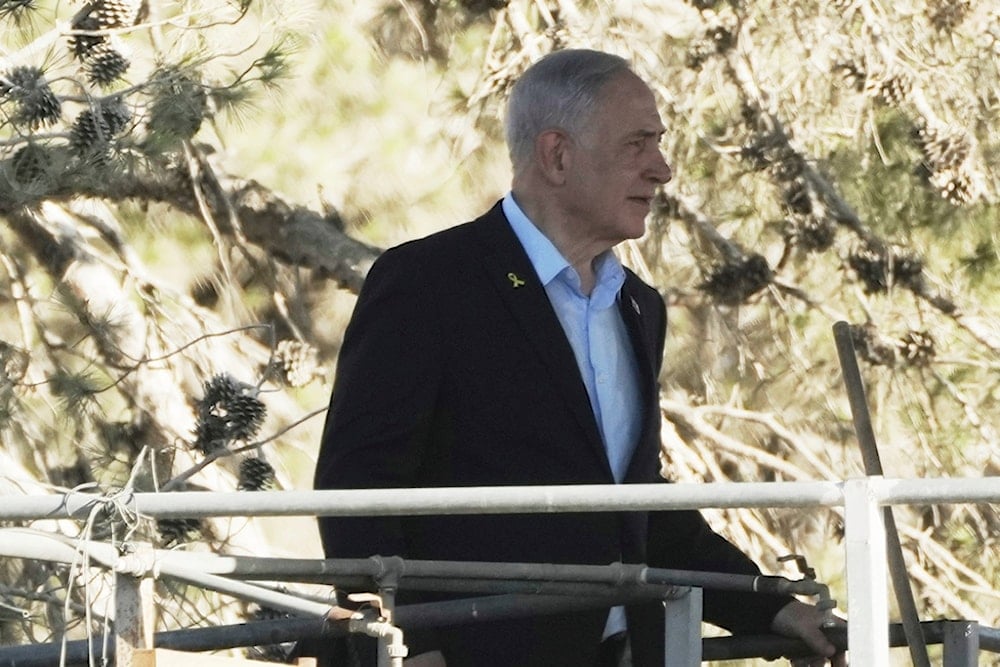Netanyahu, army chief clash over Gaza ethnic cleansing plans
A leaked report reveals a fierce dispute between Netanyahu and his Chief of Staff over plans to evacuate Gaza of civilians, with warnings of chaos and loss of control.
-

Israeli Prime Minister Benjamin Netanyahu stands on a platform overlooking the Gaza Strip during his first visit to Kibbutz Nir Oz in southern occupied Palestine, Thursday, July 3, 2025 (AP)
A heated confrontation broke out in the Israeli occupation Prime Minister’s office on Thursday evening, exposing deep fractures between political and military leaders over the future of operations in the Gaza Strip.
The contentious meeting, revealed in a report by Channel 12’s political correspondent Yaron Avraham, centered on the Israeli occupation forces' next steps should negotiations for a prisoner exchange collapse in the coming days.
The gathering, which included Prime Minister Benjamin Netanyahu, Chief of Staff Eyal Zamir, and several far-right cabinet members, quickly descended into what Israeli media called “the loudest confrontation yet” between the military and political leadership since the start of the war.
According to the report, ministers Bezalel Smotrich and Itamar Ben Gvir launched sharp criticisms of the Israeli occupation forces' performance in Gaza, accusing the military of failing to meet its objectives. “You haven’t done what you promised,” they reportedly told Zamir.
IOF 'carrying out its tasks'
In response, the IOF chief rejected claims of stagnation, asserting that the Israeli occupation forces were carrying out their assigned missions. “We are doing exactly what we were tasked with,” Zamir said, warning politicians to “be careful with their words,” especially while soldiers were “being killed in battle.”
Netanyahu, visibly agitated, reportedly shifted the discussion toward a large-scale civilian evacuation plan. “We need a plan to evacuate residents to the south of the Gaza Strip,” he said. He later emphasized that leaving Hamas in control of any part of the territory was unacceptable, declaring, “I will not allow Hamas to remain in Gaza under any circumstances.”
Smotrich supported the idea of intensifying the campaign, suggesting a full blockade on northern Gaza. “Impose a siege on the north. That’s how we’ll topple Hamas quickly,” he reportedly said.
'Israel will handle it'
Zamir pushed back, questioning the feasibility of such a move. “Do you want military governance? Who will manage two million people?” he asked. He warned that displacing civilians without adequate infrastructure or planning could lead to chaos and provoke a backlash against Israeli forces. “Managing these people while they’re hungry and angry could result in a loss of control. They might explode in our faces.”
At that point, Netanyahu reportedly raised his voice and insisted, “The army and the State of Israel will handle it. I don’t want military rule, but I want them moved to a large civilian area. The alternative is a full re-occupation of the Strip, and that means killing the hostages. I won’t allow that.”
Despite Zamir’s objections and insistence that such a plan had not yet been agreed upon, Netanyahu concluded the meeting with an order: “Prepare the evacuation plan. I want it on my desk when I return from Washington.”
Growing rift among Israeli leadership
An intensifying internal rift has emerged within the Israeli government as the Security and Finance ministries battle over critical defense funding for recent wars on Gaza and Iran that were not included in the 2025 state budget, Israeli media reported.
The Security Ministry has requested an emergency allocation of 60 billion shekels to cover the cost of the unplanned offensives. However, the Finance Ministry has refused to approve the increase, leading to delays in acquiring essential equipment, including Arrow missile interceptors and armored vehicles needed by forces deployed in Gaza.
Senior security officials said the Finance Ministry is even withholding funds already approved by a joint commission established to manage long-term "defense planning". They highlighted the financial burden of deploying reservists, estimated at 1.2 billion shekels per month, as a key point of contention.
“The ground offensive on Gaza was not part of the budget. The reserve force had to be called up more than expected,” said one security official. “The Home Front Command alone needed tens of thousands of reservists.”
Funding delays affect Gaza operations
The Israeli occupation forces have urgently requested the procurement of at least 500 new Hummer vehicles, citing the deteriorating condition of older jeeps, many of which have logged over one million kilometers and have sustained damage from anti-tank attacks and explosives.
Although 632 new vehicles are already in production, the Finance Ministry’s delay in approving payments threatens their delivery. Security sources warn the vehicles may be sold to other foreign armies if funding isn't secured promptly.
The Air Force is also struggling to replenish stockpiles of critical munitions. Supplies of Arrow missile interceptors were significantly depleted during the 12-day confrontation with Iran and remain vital to ongoing operations, particularly against missile threats from Ansar Allah in Yemen and the potential for renewed aggression on Iran.

 5 Min Read
5 Min Read









